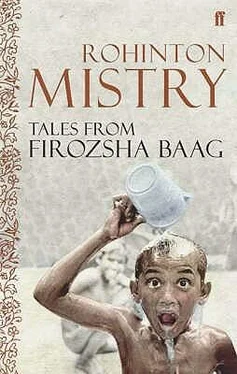Rohinton Mistry - Tales From Firozsha Baag
Здесь есть возможность читать онлайн «Rohinton Mistry - Tales From Firozsha Baag» весь текст электронной книги совершенно бесплатно (целиком полную версию без сокращений). В некоторых случаях можно слушать аудио, скачать через торрент в формате fb2 и присутствует краткое содержание. Год выпуска: 2006, Издательство: Faber & Faber, Жанр: Современная проза, на английском языке. Описание произведения, (предисловие) а так же отзывы посетителей доступны на портале библиотеки ЛибКат.
- Название:Tales From Firozsha Baag
- Автор:
- Издательство:Faber & Faber
- Жанр:
- Год:2006
- ISBN:нет данных
- Рейтинг книги:3 / 5. Голосов: 1
-
Избранное:Добавить в избранное
- Отзывы:
-
Ваша оценка:
- 60
- 1
- 2
- 3
- 4
- 5
Tales From Firozsha Baag: краткое содержание, описание и аннотация
Предлагаем к чтению аннотацию, описание, краткое содержание или предисловие (зависит от того, что написал сам автор книги «Tales From Firozsha Baag»). Если вы не нашли необходимую информацию о книге — напишите в комментариях, мы постараемся отыскать её.
Tales From Firozsha Baag — читать онлайн бесплатно полную книгу (весь текст) целиком
Ниже представлен текст книги, разбитый по страницам. Система сохранения места последней прочитанной страницы, позволяет с удобством читать онлайн бесплатно книгу «Tales From Firozsha Baag», без необходимости каждый раз заново искать на чём Вы остановились. Поставьте закладку, и сможете в любой момент перейти на страницу, на которой закончили чтение.
Интервал:
Закладка:
At the butcher’s, Daulat and Minocher had always argued about oxtail which neither had ever eaten. Minocher wanted to try it, but she would say with a shudder, “See how they hang like snakes. How can you even think of eating that? It will bring bad luck, I won’t cook it.”
He called her superstitious. Oxtail, however, remained a dream deferred for Minocher. After his illness commenced, Daulat shopped alone, and at the meat market she would remember Minocher’s penchant for trying new things. She picked her way cautiously over the wet, slippery floors, weaving through the narrow aisles between the meat stalls, avoiding the importunating hands that thrust shoulders and legs and chops before her. But she forced herself to stop before the pendent objects of her dread and fix them with a long, hard gaze, as though to stare them down and overcome her aversion.
She was often tempted to buy oxtail and surprise Minocher — something different might revive his now almost-dead appetite. But the thought of evil and misfortune associated with all things serpentine dissuaded her each time. Finally, when Minocher had entered the period of his pseudo-convalescence, he awakened after a peaceful night and said, “Do me a favour?” Daulat nodded, and he smiled wickedly: “Make oxtail soup.” And that day, they dined on what had made her cringe for years, the first hearty meal for both since the illness had commandeered the course of their lives.
Daulat rose from the armchair. It was time now to carry out the plan she had made yesterday, walking past the Old-Age Home For Parsi Men, on her way back from the fire-temple. If Minocher could, he would want her to. Many were the times he had gone through his wardrobe selecting things he did not need or wear any longer, wrapped them in brown paper and string, and carried them to the Home for distribution.
Beginning with the ordinary items of everyday wear, she started sorting them: sudras , underwear, two spare kustis , sleeping suits, light cotton shirts for wearing around the house. She decided to make parcels right away — why wait for the prescribed year or six months and deny the need of the old men at the Home if she could (and Minocher certainly could) give today?
When the first heap of clothing took its place upon brown paper spread out on his bed, something wrenched inside her. The way it had wrenched when he had been pronounced dead by the doctor. Then it passed, as it had passed before. She concentrated on the clothes; one of each in every parcel: sudra , underpants, sleeping suit, shirt would make it easier to distribute.
Bent over the bed, she worked unaware of her shadow on the wall, cast by the soft light of the oil lamp. Though the curtainless window was open, the room was half-dark because the sun was on the other side of the flat. But half-dark was light enough in this room into which had been concentrated her entire universe for the duration of her and Minocher’s ordeal. Every little detail in this room she knew intimately: the slivered edge of the first compartment of the chest of drawers where a sudra could snag, she knew to avoid; the little trick, to ease out the shirt drawer which always stuck, she was familiar with; the special way to jiggle the key in the lock of the Godrej cupboard she had mastered a long time ago.
The Godrej steel cupboard Daulat tackled next. This was the difficult one, containing the “going-out” clothes: suits, ties, silk shirts, fashionable bush shirts, including some foreign ones sent by their Canadian nephew, Sarosh-Sid, and the envy of Minocher’s friends. This cupboard would be the hard one to empty out, with each garment holding memories of parties and New Year’s Eve dances, weddings and navjotes . Strung out on the hangers and spread out on the shelves were the chronicles of their life together, beginning with the Parsi formal dress Minocher had worn on the day of their wedding: silk dugli , white silk shirt, and the magnificent pugree. And to commence her life with him all she had had to do was move from her parents’ flat in A Block to Minocher’s in C Block. Yes, they were the only childhood sweethearts in Firozsha Baag who had got married, all the others had gone their separate ways.
The pugree was in its glass case in the living-room where Daulat had left it earlier. She went to it now and opened the case. It gleamed the way it had forty years ago. How grand he had looked then, with the pugree splendidly seated on his head! There was only one other occasion when he had worn it since, on the wedding of Sarosh-Sid, who had been to them the son they never had. Sarosh’s papers had arrived from the Canadian High Commission in New Delhi, and three months after the wedding he had emigrated with his brand new wife. They divorced a year later because she did not like it in Canada. For the wedding, Minocher had wanted Sarosh to wear the pugree, but he had insisted (like the modern young man that he was) on an English styled double-breasted suit. So Minocher had worn it instead. Pugree-making had become a lost art due to modern young men like Sarosh, but Minocher had known how to take care of his. Hence its mint condition.
Daulat took the pugree and case back into the bedroom as she went looking for the advertisement she had clipped out of the Jam-E-Jamshed . It had appeared six days ago, on the morning after she had returned from the Towers Of Silence: “Wanted — a pugree in good condition. Phone no. ____.” Yesterday, Daulat had dialled the number; the advertiser was still looking. He was coming today to inspect Minocher’s pugree.
The doorbell rang. It was Najamai. Again. In her wake followed Ramchandra, lugging four chairs of the stackable type. The idea of a full-time servant who would live under her roof had always been disagreeable to Najamai, but she had finally heeded the advice of the many who said that a full-time servant was safer than an odd-job man, he became like one of the family, responsible and loyal. Thus Najamai had taken the plunge; now the two were inseparable.
They walked in, her rancid-fat-dhansaak-masala smell embroidered by the attar of Ramchandra’s hair oil. The combination made Daulat wince.
“Forgive me for disturbing you again, I was just now leaving with Ramu, many-many things to do today, and I thought, what if poor Daulat needs chairs? So I brought them now only, before we left. That way you will…”
Daulat stopped listening. Good thing the bedroom door was shut, or Najamai would have started another oil lamp exegesis. Would this garrulous busybody never leave her alone? There were extra chairs in the dining-room she could bring out.
With Sarosh’s cassette recorder, she could have made a tape for Najamai too. It would be a simple one to make, with many pauses during which Najamai did all the talking. Neighbour Najamai Take One — “Hullo, come in” — (long pause) — “hmm, right” — (short pause) — “yes yes, that’s okay” — (long pause) — “right, right.” It would be easy, compared to the tape for condolence visitors.
“ … you are listening, no? So chairs you can keep as long as you like, don’t worry, Ramchandra can bring them back after a month, two months, after friends and relatives stop visiting. Come on Ramu, come on, we’re getting late.”
Daulat shut the door and withdrew into her flat. Into the silence of the flat. Where moments of life past and forgotten, moments lost, misplaced, hidden away, were all waiting to be recovered. They were like the stubs of cinema tickets she came across in Minocher’s trouser pockets or jackets, wrung through the laundry, crumpled and worn thin but still decipherable. Or like the old program for a concert at Scot’s Kirk by the Max Mueller Society of Bombay, found in a purse fallen, like Scot’s Kirk, into desuetude. On the evening of the concert Minocher, with a touch of sarcasm, had quipped: Indian audience listens to German musicians inside a church built by skirted men — truly Bombay is cosmopolitan. The encore had been Für Elise . The music passed through her mind now, in the silent flat, by the light of the oil lamp: the beginning in A minor, full of sadness and nostalgia and an unbearable yearning for times gone by; then the modulation into C major, with its offer of hope and strength and understanding. This music, felt Daulat, was like a person remembering — if you could hear the sound of the working of remembrance, the mechanism of memory, Für Elise was what it would sound like.
Читать дальшеИнтервал:
Закладка:
Похожие книги на «Tales From Firozsha Baag»
Представляем Вашему вниманию похожие книги на «Tales From Firozsha Baag» списком для выбора. Мы отобрали схожую по названию и смыслу литературу в надежде предоставить читателям больше вариантов отыскать новые, интересные, ещё непрочитанные произведения.
Обсуждение, отзывы о книге «Tales From Firozsha Baag» и просто собственные мнения читателей. Оставьте ваши комментарии, напишите, что Вы думаете о произведении, его смысле или главных героях. Укажите что конкретно понравилось, а что нет, и почему Вы так считаете.












